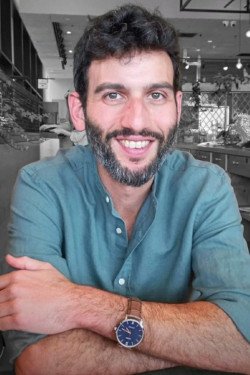Zvika Brakerski
2023 Israel Award Winner — Faculty

Current Position:
Associate Professor
Institution:
Weizmann Institute of Science
Discipline:
Computer Science

Current Position:
Associate Professor
Institution:
Weizmann Institute of Science
Discipline:
Computer Science
Recognized for: Developing the first efficient encryption algorithm that performs computations on encrypted data without the need of first decrypting the data. His algorithm for the first time turns such a computing scheme from a “science fiction” to a practical application, with huge potential to improve the security of cloud computing. In addition, he has also developed new cryptography algorithms to verify the output of quantum computations.
Areas of Research Interest and Expertise:
Theoretical Computer Science, Theory of Cryptography, Computing on Encrypted Data, Lattice-based Cryptography, Quantum and Post-quantum Cryptography
Previous Positions:
BSc in Electrical Engineering and Computer Science, Tel-Aviv University
MSc in Electrical Engineering, Tel-Aviv University (Boaz Patt-Shamir)
PhD in Computer Science, Weizmann Institute of Science (Shafi Goldwasser)
Simons Postdoctoral Fellow, Stanford University, USA (Dan Boneh)
Research Summary:
Zvika Brakerski, PhD, is a pioneer in cryptography. He has continually introduced novel cryptographic solutions with far-reaching practical implications on the security of cloud computing and quantum computing.
With the rise of the cloud computing, confidential or sensitive data often need to be sent and computed on remote, untrusted cloud computers, which may leak the data during their processing. To solve this problem, an idea dubbed fully homomorphic encryption (FHE) emerged in the 1970s, which allows computers to directly perform computations on encrypted data without the need to first decrypting them. In other words, the cloud computers do not know the data they are processing at all. Though FHE sounds very useful, whether such encryption schemes exist remained an open question for decades until 2009, when the first FHE algorithm was constructed. But this initial FHE scheme has two major drawbacks: it relies on an unproven mathematical conjecture; furthermore, it is very complex and takes too much time to complete the computations. Brakerski, together with his collaborator, raised a newer scheme that improves the mathematical foundation of FHE and is significantly more efficient. His version of FHE algorithms are now developed and implemented by many companies worldwide.
Brakerski has also realized major breakthroughs related to the use of cryptography in quantum computing. This includes studying the cryptographic hardness that underlies quantum-resistant cryptography. Whereas commonly used methods are known to be insecure in the quantum setting, a concept called “lattice-based cryptography” has emerged since the 1990s as a quantum secure alternative. Brakerski’s work showed how to construct various cryptographic building blocks that are frequently used to build cryptographic protocols based on this concept. In addition, he showed how a classical computing system can “control” the behavior of a quantum computer using cryptography. This may allow us to develop secure “cloud quantum-computers” where the quantum cloud can be supervised by the classical user.
"Scientists and Mathematicians are often driven by a feeling that something “has to” be right, without knowing the exact reason. The scientific process is sometimes that of reconciling this feeling with reality. Moments of enlightenment are those where we discover an elegant basic principle that underlies a complex phenomenon."
Key Publications:
Other Honors:
2022 Gödel Prize for Outstanding Papers in the Area of Theoretical Computer Science, ACM SIGACT and EATCS
2022 FOCS 10 Year Test of Time Award, IEEE
2017 Krill Prize for Excellence in Scientific Research, Wolf Foundation
2015 Faculty Research Award, Google
2015 Prof. Pazy Memorial Research Award for most outstanding and original research proposal in mathematical sciences, Binational Science Foundation (BSF)
2014 Alon Memorial Fellowship for Excellent Young Faculty, Israeli Council for Higher Education
In the Media:
How to Turn a Quantum Computer Into the Ultimate Randomness Generator, Quanta Magazine
Alice and Bob in Cipherspace, American Scientist
Up in a Cloud for Processing Computer Data, The Jerusalem Post